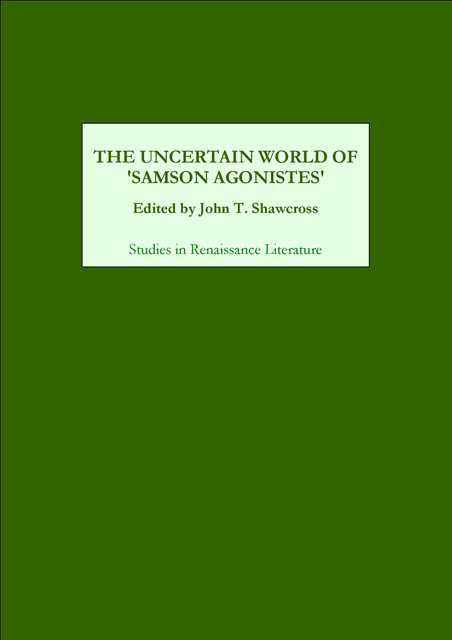Book contents
- Frontmatter
- Contents
- Preface
- Chapter 1 The World of Samson Agonistes
- Chapter 2 Uncertainty and the Text
- Chapter 3 The Dramatic Work and its Reading
- Chapter 4 Samson: God’s Champion, a Type, or Individual?
- Chapter 5 Dalila: Seductress or Wife?
- Chapter 6 Politics in the Destabilized Text
- Chapter 7 Biographical Intrusions
- Chapter 8 The Uncertainties of Irony
- Chapter 9 A Hermeneutics of the Text
- Chapter 10 Samson Agonistes and Consistencies of Belief
- Works Cited
- Index
Chapter 4 - Samson: God’s Champion, a Type, or Individual?
Published online by Cambridge University Press: 22 March 2023
- Frontmatter
- Contents
- Preface
- Chapter 1 The World of Samson Agonistes
- Chapter 2 Uncertainty and the Text
- Chapter 3 The Dramatic Work and its Reading
- Chapter 4 Samson: God’s Champion, a Type, or Individual?
- Chapter 5 Dalila: Seductress or Wife?
- Chapter 6 Politics in the Destabilized Text
- Chapter 7 Biographical Intrusions
- Chapter 8 The Uncertainties of Irony
- Chapter 9 A Hermeneutics of the Text
- Chapter 10 Samson Agonistes and Consistencies of Belief
- Works Cited
- Index
Summary
THE positive view of the biblical Samson, representing an agent of the true God who pulls down the pillars around the heads of those opposed to the true God and his nation, overlies Milton’s poem. One can understand the flickerings of a Christ typology illuminating this Samson, particularly after one has moved in the 1671 volume from the earthly Jesus who will become the Christ (with his ministry and crucifixion after the end of the poem) to a human being who has succumbed to wrong thinking and who now, through trial, must learn repentance. In his final actions he joins the presentations of Milton’s contemporaries as the culture hero that Jackie Di Salvo has delineated for us. Milton’s dramatic poem, however, is concerned with how the positive Samson recovered from his errors of the past, what those errors were, and thus how they can be overcome. While in his final actions Milton’s Samson may become a symbol of the Good Old Cause as Christopher Hill views the biblical Samson, within the full poem more has happened and is happening, setting up a criticism of the adherents of that cause which has failed through such errors as are observable in the representative Samson. Such underlying criticism of the adherents of the Good Old Cause, not the Cause itself, is similar to Milton’s intent in The Tenure of Kings and Magistrates (1649), which he wrote
not to argue against adherents of the king but against those who align themselves with reform yet draw back as consequent acts, dictated by reason, arise, … who have resisted Charles only to balk at reasonable outcomes of their prior actions because of custom and self-interest … [H]is audience consists of those who “begin to swerve and almost shiver” through false argument and emotional tugs upon them.
If Samson does represent the Good Old Cause, it has failed in the past because of pride, foremost, but also because of abrogation of vows and self-interest.
On the other hand, Laura Lunger Knoppers argues that the execution of the regicides and its spectacle of martyrdom in the early years of the Restoration provided Milton with example for Samson as divine witness to the Good Old Cause.
- Type
- Chapter
- Information
- The Uncertain World of Samson Agonistes , pp. 48 - 64Publisher: Boydell & BrewerPrint publication year: 2001



